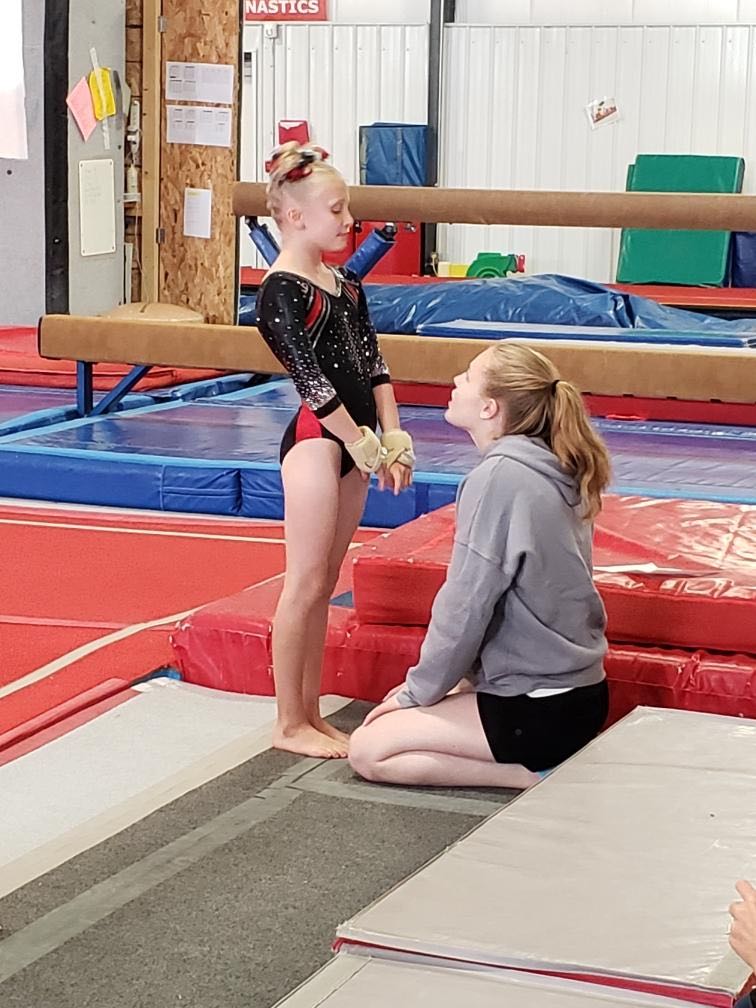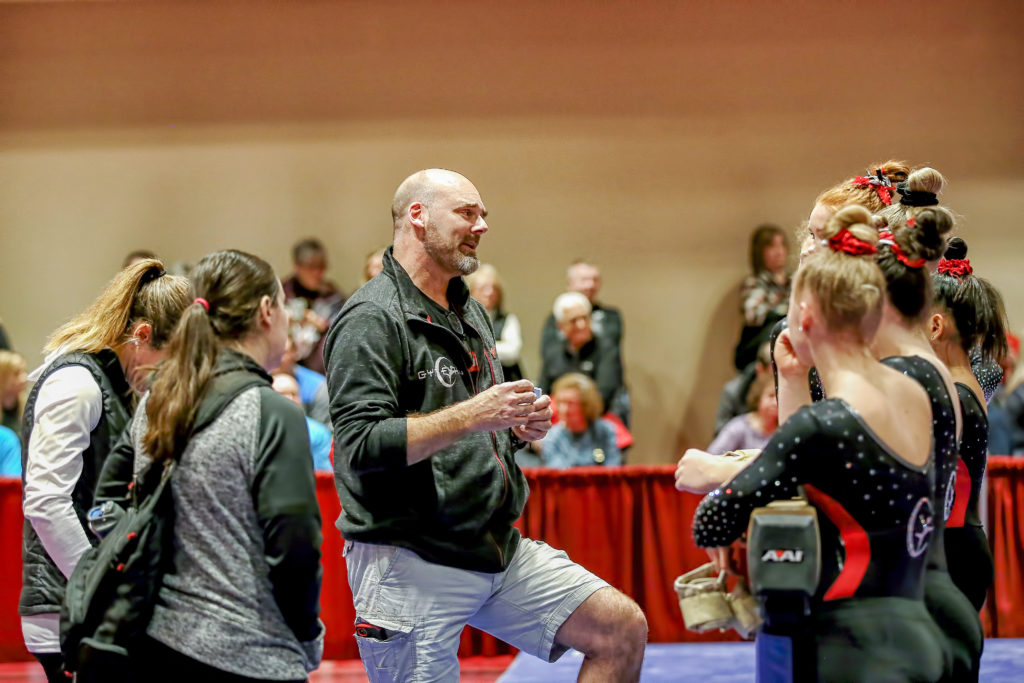After The Cartwheel: Part 2 of 2
Last post I wrote about a few of the many lessons that I learned by doing gymnastics. I was asked after that last post went live, if the same things couldn’t be learned elsewhere. Of course, they could. But I responded with a story, as I frequently do. I shared about the dad of a girl I once taught who was a physics teacher. While coaching his daughter I talked about Center of Mass (beam & bars), conservation of angular momentum (flipping on tumbling and vault) and other physics applications as they could be related to gymnastics. He told me that his 9-year-old daughter knew more about physics than many high school students because she learned it and saw the application firsthand. So, could what I wrote about be learned in other ways? Yes, to paraphrase This is Spinal Tap, but these are from gymnastics.

Lesson #3: Speak Up; Be An Advocate For Yourself
We tell kids immediately that if they don’t understand, if they feel uncomfortable, or if they have questions that they must speak up. We realize that talking to the coach can be intimidating. Kids don’t want to disappoint us or have us think they are not capable. However, the trust between a coach and an athlete can only develop through communication. I have kids with minor aches and pains keep it to themselves because they didn’t want to get “in trouble”. I have had kids fail to tell me about vacations because they thought I would be mad. I have kids doing other sports keep it a secret because they thought I would not approve. I explain to them that it has to start with trust. They have to trust that I will listen and advise them accordingly. Most often, kids come around when they see that coaches are there to support them. Then, the trust foundation becomes obvious.
When kids are at gymnastics practice, they are not accompanied by a parent. Kids who have parents do their talking are often unable to advocate for themselves. My mother always made me speak what I was thinking, but I had to weigh what was more appropriate: respecting authority or speaking up. Once, I was at a gymnastics camp and the group I was training with went to practice pommel horse. I was a tumbler and vaulter and had not done pommels in about 5 years. I struggled and fell a lot, other guys showed their skills and were given corrections but not me. On my turns the coach would just say, to try it again. Finally after one turn he said “have you ever tried doing it like this?” I said, “no sir, I don’t even do pommel horse.” I remember thinking that I might be seen as disrespectful by speaking up. Mom said listen to the coaches. They were the ones that put me in that group, so…. After explaining that I was a floor and vault specialist he sent me to the floor group that I should have been in and said to me “next time speak up if you don’t know where you are supposed to be.” I look back now and see that if I would have said I didn’t do that event, I would have more focus on what I actually came for, the pommels guys wouldn’t have had to watch the train wreck of a floor guy swinging horse, and the coaches would have been happier had I exercised my voice more emphatically. Live and learn.

Communication skills are so important. Kids nowadays often are not given the opportunity to speak up, and they are fast losing that skill. I feel that this is so destructive. Kids need to speak up. They need to say what they are thinking, they need to be proud when they say it right and they even need to get it wrong sometimes too. They need to figure out how to clear up what they are trying to say. It is by doing this that we learn, not only to better communicate, but to have the self confidence to present our thoughts. Mom said the squeaky wheel gets the grease, but never was it more evident to me than in the gym.
Lesson #4: Understanding Yourself; Learning To Be Patient
In these times everyone is so expectant of instant results. Instant made products and immediate feedback programs are normal for us. Unfortunately, that means we have lost our ability to wait. We have no patience.
In gymnastics we develop skills over long periods of time. We sometimes lay the groundwork for skills by doing drills years before they may utilize what they learned for a particular skill. Complicate that with normal ups and downs of training, goals being realigned, and even sickness/injury/vacation costing training time and it can seem like learning a skill takes forever.
I had a gymnast on vault last night who was very frustrated that she wasn’t landing each attempt of a very difficult vault perfectly. I had to remind her that last year at this time she was doing an easier vault and hitting about 10%. Now she was hitting more like 70%. A big improvement, obviously, but kids don’t remember a year ago. They often don’t remember yesterday. When I explained that it was a slow process to be able to safely do it right and shared the progress she had seen over the year, she was able to let go of the frustration a little. She tried a few more and hit each one. I asked her to be patient.

I often explain to kids that we are all wearing invisible backpacks. When we get frustrated with pace, or outcomes it is like putting a heavy rock into our pack. Then we expect to be able to make progress, but we are weighed down by our own decision to carry so many extra rocks. Learning patience allows us to remove a good number of stones from off our backs. It makes lighter work of anything we are trying to accomplish.
Lesson #5: Keep An Open Mind; Sometimes Missing The Mark Is Better Than The Mark
The best laid plans often go astray, and that’s not always a bad thing. Our culture is very future facing and that can be good since the past is done and over, and the present is all you can control. The future is, at best, a plan we try to follow. We set out on our plan and often find that the original plan is not always the best course of action.
In my life I had many plans that didn’t work out. I was hired as a middle school teacher. The plan was that I would teach, become the head of the department, dabble in administration, then retire. Easy plan. But I was too strong willed and idealistic to work in the conservative school system where I was hired and it snuffed my passion for the classroom right out. I was coaching at the time to make ends meet. Since teaching didn’t work, I thought I would follow my passion and see what that could do. I put all I had into coaching and now many years later, here I am. Coaching, running a business, and happy.
The plan was great but better outcomes were found off the plan.
We see pivots all the time when developing gymnasts. We may train certain skills but find other skills seem to detract from the original intention. Most often it is because we have strengths and weaknesses revealed to us as we grow. We navigate toward our strengths and avoid the deficits. Often, we end up with completely different routines and even different intentions than what we started with. This is typical and it’s fun. To be able to manipulate our training into new and different ways means that it is always exciting and never gets old; not for the coach and not for the gymnast either.
This kind of flexibility is invaluable as we grow up. Learning to not be overly focused on our forward motion means that we often find shortcuts by stepping sideways. I believe that the ability to do this is paramount for long term success.
5 lessons I have been able to identify in myself and my gym kids. Admittedly, no coach sets out to teach such lessons. Instead they are arrived at more like happy side-effects. By allowing kids to participate in sports, especially gymnastics, they develop life skills, problem solving, social skills, coping mechanisms, cognitive reasoning, responsibility, respect, strong work ethic, and more. But in gymnastics we get to learn the cartwheels too, and there is nothing better than that.

